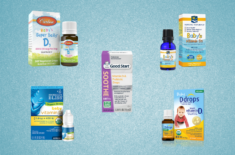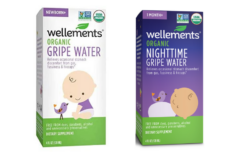Constipation: Why Do Babies Struggle With Pooping?
Because they’re on a liquid diet (breast milk or infant formula), babies have soft poop, which is easy to pass. When they struggle to poop, they might have constipation.
Each baby is different and can have varied pooping patterns, but if they have constipation, it could be due to the components of their milk. For example, cow’s milk can cause chronic constipation. (1)
For toddlers and young children, constipation might be due to certain dietary issues, such as inadequate fiber or liquids.
In rare cases, infant constipation might be due to certain medications or an underlying medical condition, such as congenital issues along their digestive tract or intestines.
In most cases, however, constipation isn’t a serious condition.
According to the AAP (American Academy of Pediatrics), the prevalence of constipation is difficult to determine because it’s usually treated with dietary changes and simple home remedies. (2)
We’ll discuss the causes of constipation below and the home remedies you can try to alleviate your baby’s symptoms.
How Can I Relieve My Baby’s Constipation Fast?
Several ways to help relieve your infant’s constipation include changing their formula or baby food, increasing their liquid intake, adding more fiber to their diet, etc.
You might also make changes to your diet if you’re breastfeeding.
But many parents use over-the-counter constipation relief products to make their baby poop easily. These remedies work for breastfed and formula-fed babies.
However, because your baby’s immune and digestive systems are still developing, it’s best to consult your pediatrician before giving any home remedy or dietary supplement.
4 Baby Constipation Relief Products
- Wellements Organic Constipation Support (4 fl oz – $12.49) – USDA-certified organic constipation relief drops with prebiotics (specialized plant fibers that help promote better digestion and induce the activity of probiotics or good gut bacteria)
- Little Spoon Poopie Power ($5.99 for a box with five packs, 2.0 g) – Non-GMO (free from genetically modified organisms) constipation relief powder with prebiotics and probiotics
- Mommy’s Bliss Constipation Ease (4 fl oz – $11.49) – NSF-certified (National Sanitation Foundation) shelf-stable constipation relief drops that don’t require refrigeration and can be used by the whole family
- Secrets Of Tea Baby Constipation Relief Tea (20 tea bags – $65) – USDA-certified organic constipation relief tea that the brand claims to be FDA-approved and ISO-certified
Continue reading to learn more about each baby constipation relief product.
Wellements Organic Constipation Support

Price
- One bottle, 4 fl oz – $12.49
What Makes It Special?
- Contains prebiotics (chicory root fiber)
- Might start working in as fast as 30 minutes
- USDA-certified organic (U.S. Department of Agriculture)
Key Features
- Key Ingredients: Organic chicory root fiber, organic prune concentrate, organic vegetable glycerin, citric acid, and filtered water
- Dosage: 1 tsp for 6-12 months of age, 2 tsp for 1-3 years old, or 1 tbsp for 3+ years old
- How It’s Administered: Taken by mouth once or twice a day until the symptoms improve
- Safety Features: Free from gluten, preservatives, parabens, artificial flavors, artificial colors, and the top 8 allergens*
- Third-party Testing & Certification: USDA-certified organic
*The top 8 allergens are the following: milk, fish, crustacean shellfish, eggs, peanuts, tree nuts, wheat, and soybeans.
Product Recall
- None
Cons
- Needs to be refrigerated once opened (because it doesn’t have preservatives)
- Must be discarded if left unrefrigerated for several hours or exposed to high temperatures
- Must be discarded four weeks after opening
- Some complaints that it didn’t work as advertised
Brand’s Other Products For Kids
Some of Wellements’ other products for babies and young children:
- Organic gripe water
- Organic baby cough syrup
- Organic liquid probiotics
- Organic vitamin D drops
- Organic baby tooth oil
- Organic multivitamin drops
- Organic baby chest and foot rub
- Organic all-purpose balm
- Organic iron drops
- Organic baby immune support
Little Spoon Poopie Power

Price
- $5.99 for a box with five packs (2.0 g)
What Makes It Special?
- Contains 1 billion CFUs (colony forming units) of Lactobacillus rhamnosus DSM 6594, a clinically researched probiotic strain
- Non-GMO (free from genetically modified organisms)
- Vegetarian product
- Gluten-free
- Contains 10 mg of potassium and 1 g of fiber
Key Features
- Key Ingredients: Organic prune powder, organic prebiotics (chicory fiber fructooligosaccharides), organic dragon fruit powder, organic spinach powder, organic strawberry powder, and probiotics (Lactobacillus rhamnosus DSM 6594)
- Dosage: One stick is good for one serving
- How It’s Administered: Mix the powder with baby food or any liquid your baby prefers (breast milk, infant formula, water, or fruit juice); just give it a good shake to dissolve the powder.
- Safety Features: Free from gluten, GMOs, preservatives, artificial sugar, corn syrup, gelatin, and syrups
- Third-party Testing & Certification: Not indicated
Product Recall
- None
Cons
- In powder form instead of drops
Brand’s Other Products For Kids
- Organic baby food purée
- Organic toddler and big kids’ meals
- Sniffle Shield (immune system booster)
- Wiz Kid (boosts healthy brain development)
Mommy’s Bliss Constipation Ease

Price
- One bottle, 4 fl oz – $11.49
What Makes It Special?
- Doesn’t require refrigeration
- NSF-certified (National Sanitation Foundation)
- Gentle formulation without harsh laxatives
Key Features
- Key Ingredients: Prune juice, citrus bioflavonoids extract, vegetable glycerin, purified water, potassium sorbate (as a preservative), organic ginger root, organic chamomile flower, organic fennel seed, organic lemon balm leaf, organic passion flower leaf, citric acid, and sodium bicarbonate
- Dosage: 1 tsp for 6 months to 3 years of age, 2 tsp for 3+ years old, and 2 tbsp for adults
- How It’s Administered: Can be added to food and milk or taken orally up to twice a day
- Safety Features: Free from added sugar, alcohol, artificial flavors or colors, binders and fillers, soy, yeast, petroleum-based by-products, parabens, and the top 8 allergens
- Third-party Testing & Certification: NSF-certified
Product Recall
- None
Cons
- Contains vegetable glycerin, a commonly used remedy for constipation and an FDA-approved food additive that could sometimes cause side effects such as excessive bowel activity, cramping, headaches, dizziness, diarrhea, nausea, rectal irritation, and vomiting (3)(4)
- Studies show that glycerin suppositories or enemas might increase a premature baby’s risk of NEC (necrotizing enterocolitis), a condition that causes inflammation and death of cells in the intestines, leading to holes that can leak stool and bacteria into the bloodstream (5)
- Some complaints about the product having a horrible or nasty taste
Brand’s Other Products For Kids
Some of Mommy Bliss’ other products for kids:
- Gas relief drops
- Gripe water drops
- Gripe water gel
- Vitamin D drops
- Probiotic drops + vitamin D
- Organic baby cough syrup
- Organic baby elderberry drops
- Nasal relief spray
- Organic gum massage gel
- Newborn essentials gift set
Secrets Of Tea Baby Constipation Relief Tea

Price
- One canister, 20 tea bags – $65
What Makes It Special?
- Caffeine-free tea
- USDA-certified organic
- Kosher and Halal certified
- Completely vegan
- The brand claims that this is an FDA-approved and ISO-certified product.
Key Features
- Key Ingredients: Organic whole fennel, organic fennel seeds, organic dandelion, organic cumming whole seed, and organic peppermint
- Dosage: 1-3 oz for up to 3 months of age, 3-6 oz for 3-6 months old, and 6-8 oz for 6-12 months old
- How It’s Administered: Boil one tea bag in 8 oz water for 2 minutes. Once cool, you can give the tea to your baby or add it to their formula. You can also drink the tea if you’re breastfeeding to pass its benefits to breast milk.
- Safety Features: Free from soy, dairy, and gluten
- Third-party Testing & Certification: FDA-approved, ISO-certified, and USDA-certified
Product Recall
- None
Cons
- Unlike constipation relief drops that need just a few drops, you’ll have to give your baby several ounces of this product.
- Some complaints about babies becoming gassy or pooping with blood after taking this product
Brand’s Other Products For Kids
- Baby sleep tea
- Organic magic tea for colic, gas, and constipation
- Gripe water
Summary & Recommendations
You can pick any of these baby constipation relief products, depending on your baby’s needs.
Choose Wellements Organic Constipation Support (4 fl oz – $12.49) if:
- You prefer USDA-certified organic constipation relief drops with prebiotics to promote better digestion and induce the probiotic activity
- You want one that might work in as fast as 30 minutes
- You don’t mind that it needs to be refrigerated (because it doesn’t have preservatives)
- You don’t mind that it needs to be discarded if not refrigerated for a few hours
- You don’t mind that it needs four weeks after opening
Choose Little Spoon Poopie Power ($5.99 for a box with five packs, 2.0 g) if:
- You prefer non-GMO (free from genetically modified organisms) constipation relief powder with prebiotics and probiotics
- You want a vegetarian product
- You’re looking for a product with potassium
- You don’t mind that it’s a powdered product, not liquid drops
Choose Mommy’s Bliss Constipation Ease (4 fl oz – $11.49) if:
- You’re looking for NSF-certified (National Sanitation Foundation) shelf-stable constipation relief drops that don’t require refrigeration
- You want a product that the whole family can use
- You don’t mind that it contains vegetable glycerin (a common constipation remedy) and preservatives (potassium sorbate) to make it shelf-stable
Choose Secrets Of Tea Baby Constipation Relief Tea (20 tea bags – $65) if:
- You want USDA-certified organic constipation relief tea that’s FDA-approved and ISO-certified (as the brand claims)
- You prefer a completely vegan, Kosher, and Halal-certified product
- You don’t mind that it’s a tea product (caffeine-free)
- You don’t mind that your baby needs to drink several ounces of this tea instead of using just a few drops like other products
IMPORTANT: Because of your baby’s still-developing immune and digestive systems, it’s best to seek medical advice from your health care provider before giving any home remedy or dietary supplement.
What Can Cause Constipation In Babies?
There are different reasons why your baby might have hard stools and constipation, including:
- Cow’s milk intolerance (1)
- Certain issues in your baby’s diet, such as inadequate fiber or liquids
- First time eating solids or introduction to new foods (6)
- Certain medications, such as iron supplements
- Underlying medical conditions (rare cases), including congenital abnormalities along the intestinal or digestive tract and neurological problems
Symptoms & Signs Of Constipation
The signs of constipation aren’t always the same, even for the same baby. But here are the most common symptoms:
Straining To Poop
Dry, hard stools can be difficult to pass. If you notice your baby straining or showing discomfort while trying to poop, they might have constipation.
Some babies might also cry or become fussy while trying to pass the dry stool.
Check their poop, especially for signs of blood, with each diaper change.
Hard stools might also cause small cuts or injury to your baby’s rectum that could worsen their ordeal each time they need to poop.
Infrequent Bowel Movements: Is Passing Few Poops A Week Still Normal?
It’s not unusual for breastfed babies to take several days before pooping again. That’s actually normal as long as they’re steadily gaining weight and don’t have other worrisome symptoms. (7)
Even if their bowel movements are less frequent than formula-fed babies, their poop should be soft and easy to pass.
It’s only when they have hard, dry stools and experience other symptoms that you might consider constipation.
Changes In Stool Appearance
A baby’s stool is normally soft but not loose or watery.
Constipation can make their poop look like small, hard pebbles or even as large as a golf ball.
Firm, Hard Belly
Constipation keeps your baby’s stool in their large intestines, making your baby’s tummy feel firm and hard.
Blood In Your Baby’s Stool
Straining can cause cuts or tears in your baby’s rectum, leading to streaks of blood in their stool.
Stomach Pain
Often, constipation can lead to bloating and stomach pain because gas is trapped in their intestines.
In worse cases, their tummy can become swollen, making the pain worse.
Refusal To Eat
Because they feel discomfort in their tummy, your baby might refuse to eat or drink milk.
12 Home Remedies: How Can I Stimulate My Baby To Poop?
1. Change Your Baby’s Formula
Cow’s milk intolerance is one of the main reasons babies experience constipation, especially if it’s their first time to consume formula. (1)
You can opt for a dairy-free formula, but be sure to check with your pediatrician before making the switch. Some babies might need more than just a dairy-free option if they have certain metabolic issues.
2. What Can I Give My Baby If He’s Constipated? Use Baby Constipation Relief
The baby constipation relief options we shared above might also help ease your baby’s symptoms.
3. Increase Their Fluids
Constipation can be caused by inadequate fluid intake, so you can give your child more fluids.
If your baby is one month of age, you can give a 1 oz of apple or pear juice. (8)
If they’re three months old and older, you can opt for plum or prune juice, with a dosage of 1 oz per month of age. (8)
However, limit the fruit juice to 4 oz per day.
If possible, prepare the juice using fresh fruits to avoid introducing your baby to the high sugar content often found in commercial fruit juices. It’s best to avoid added sugar because early exposure can increase the risk of obesity and other medical issues. (9)
4. Increase High-Fiber Solid Foods
Babies ready for solid foods can try eating high-fiber foods, such as:
- Carrots
- Broccoli
- Pears
- Plums
- Mangoes
- Peaches
- Strawberries
- Oranges
- Prunes
- Skinless apples
- Avocado
Give these foods in age-appropriate slices if you’re following the baby-led weaning approach.
Although sweet potatoes are fiber-fiber, they can worsen constipation due to their high starch content.
5. Replace The Rice Cereal
Rice cereals are commonly used as babies’ first foods. But if your baby experiences constipation after eating cereal for the first time, you can choose whole-grain oats instead.
6. Opt For Puréed Foods
Purées can add more fluid to your baby’s diet when they have constipation.
Choose high-fiber foods in preparing homemade baby food.
7. Try Some Exercise
Movement in other parts of your baby’s body can also encourage digestion and bowel movement.
If your baby isn’t walking yet, you can hold their feet while lying on their back, then do gentle leg bicycles.
8. Gentle Tummy Massage
A gentle tummy massage can also stimulate their bowels. You can repeat it several times daily, but make sure you don’t push hard.
Choose child-safe essential oils and make sure to dilute them with carrier oils:
- 3-6 months – 1 drop of EO per 2.5 tbsp of carrier oil
- 6-24 months – 2-4 drops of EO per 2 tbsp of carrier oil
- 2-7 years – 6-8 drops of EO per 2 tbsp of carrier oil
- 7+ years – 12-15 drops of EO per 2 tbsp of carrier oil
NOTE: Always consult with your pediatrician before introducing essential oils to your baby or child.
9. Warm Bath
It can relax your baby’s abdominal and rectal muscles, which might help stimulate bowel movement.
10. Laxatives Or Stool Softeners
Over-the-counter laxatives and stool softeners are designed to alleviate constipation, but they’re usually not recommended for babies younger than six months of age.
Mineral oil is popular as a stool softener. It has long been used for children with:(10)
- Cystic fibrosis (a genetic disorder that affects cells producing sweat, digestive juices, and mucus)
- Exocrine pancreatic deficiency (a condition that results in maldigestion or inability to digest food properly).
However, studies show that mineral oil use in babies with certain medical conditions could lead to lipoid pneumonia (fat collection in the lungs), which can be dangerous.
Talk to your doctor before giving laxatives to a baby younger than one year old. (10)
11. Take Their Rectal Temperature
Some parents use a lubricated rectal thermometer to stimulate their baby’s rectum and help them pass stool.
However, this method might not always work and could even worsen constipation if done too often.
Try this only as one of the last resorts if the other options don’t work.
12. Glycerin Suppository
Glycerin suppositories or enemas are commonly used as a remedy for constipation in babies. Use only with your doctor’s advice.
These popular remedies can be dangerous to premature infants.
Studies show that these suppositories can increase a premature baby’s risk of NEC (necrotizing enterocolitis). This condition causes inflammation and death of cells in the intestines, which usually leads to holes that can leak stool and bacteria into the bloodstream. (5)
Although the risk isn’t usually associated with infants who weren’t born prematurely, glycerin could sometimes cause side effects such as: (4)
Prevention
You can help your baby avoid constipation by also avoiding the reasons why it can happen. Try the following:
- Consult with your pediatrician if you think you’d baby has a high milk allergy risk or if there’s a family history of milk allergy/sensitivity. Here are some dairy-free formula options. Always check with your pediatrician before making the switch.
- Increase intake of high-fiber foods for babies ready for solid foods.
Medical Therapy: When To Call Your Pediatrician
- If the home remedies above don’t work even after a few days
- Blood in your baby’s stool
- If constipation is accompanied by fever, vomiting, and their tummy looks bloated
- Your baby won’t stop crying and seems to be in pain
FAQs
Does Gripe Water Relieve Constipation?
Gripe water is a remedy for colic. It isn’t used for constipation because it might even make babies feel constipated (as a side effect).
How Long Can Your Little One Go Without Pooping?
Babies have different bowel movement patterns, but you don’t usually have to worry if your breastfed baby poops just around once or twice a week, as long as they’re steadily gaining weight and don’t have other worrisome symptoms. (7)
REFERENCES
(1) https://pubmed.ncbi.nlm.nih.gov/9770556/
(2) https://publications.aap.org/pediatricsinreview/article-abstract/41/8/379/35421/Constipation
(3) https://www.fda.gov/food/food-additives-petitions/food-additive-status-list
(4) https://www.rxlist.com/consumer_glycerin/drugs-condition.htm
(5) https://publications.aap.org/pediatrics/article-abstract/135/6/1093/75865/Glycerin-Enemas-and-Suppositories-in-Premature?redirectedFrom=fulltext
(6) https://www.childrenshospital.org/alliance/practices/longwood-pediatrics/patient-education/nutrition/starting-baby-solid-food
(7) https://www.llli.org/breastfeeding-info/constipation/
(8) https:// .net/Constipation-Baby
(9) https://www.ncbi.nlm.nih.gov/pmc/articles/PMC6959843/
(10) https://www.ncbi.nlm.nih.gov/pmc/articles/PMC2804525/











